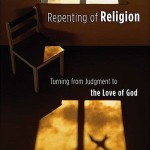We run our website the way we wished the whole internet worked: we provide high quality original content with no ads. We are funded solely by your direct support. Please consider supporting this project.
The Good Samaritan, Non-Violence & Eternal Life
An expert in the law asked Jesus what he had to do “to inherit eternal life” (See the story in Luke 10:25 and following). Jesus asked him what he thought the law said about this issue. The man responded, “’Love the Lord your God with all your heart and with all your soul and with all your strength and with all your mind’ and, ‘Love you neighbor as yourself.’” Jesus stated his agreement with the man’s answer and assured him that if he did this he would inherit eternal life.
But the man wasn’t through. “Who is my neighbor?” he asked. While the command to love one’s neighbor was universally excepted by Jews since it came straight out of the Old Testament (Leviticus 19:18), there was a good bit of controversy over who exactly qualifies as a “neighbor.” Maybe only fellow Jews should be considered neighbors. Maybe only fellow Jews who lived in close proximity to us should be considered neighbors. Maybe only faithful Jews deserve to be regarded as neighbors. Yet, some wondered, perhaps Gentiles who converted to do Judaism should also be considered neighbors. Or, maybe the category of “neighbor” extended to Gentiles who were kind to Jews, even though they didn’t convert to Judaism. Or, in contrast to all of this, were all people to be considered “neighbors”?
Jesus responded by telling the familiar story of “the Good Samaritan.”
In asking, “Who is my neighbor?” the expert was hoping to excuse himself from the duty of loving certain individuals and groups. But the story Jesus told didn’t answer this question. Rather, Jesus transformed the question, “Who is my neighbor?” into the question, “What does it look like for you to be a neighbor?” And the answer was that being a neighbor looks like the Samaritan, showing mercy to a perfect stranger and sacrificing his own resources to do it.
And then, to add insult to injury, Jesus ended the encounter by telling the man, “Go and do likewise.” Go and emulate the Samaritan, whom you formerly despised.
While the theoretical question about who is our neighbor allows us to justify not loving certain people, the personal question about how we are to be a neighbor does not. We address the theoretical, abstract question with our intellect, which is why we can debate endlessly and never get around to actually obeying it. But we can answer the personal, concrete question only with a decision of will, and there’s no way to escape it.
In light of the personal question Jesus raises, the theoretical, abstract question the religious expert raised is exposed for being what it is: namely, an attempt to hide from the personal question. When we debate who our neighbor is, we avoid having to actually engage in the sacrificial activity of being a neighbor. We continue to love only those we think deserve our love, and continue hating those we think deserve to be hated. And we feel justified in our selection.
Jesus brilliantly pulls the rug out from under this self-justifying reasoning as he forces us to ask ourselves: Will I be a neighbor to whomever I happen to come upon?
Finally, we should recall that this whole episode began with the question: “What must I do to inherit eternal life?” This has been the question on the table all along. And now we have Jesus’ answer.
To inherit eternal life, Jesus is saying, we don’t have to answer an assortment of theoretical questions about who is and is not our neighbor. To inherit eternal life, we must simply commit to being one. This isn’t to suggest we earn eternal life by being a neighbor, but it does suggest that our willingness to love and serve like the Samaritan reflects the kind of heart that inherits eternal life.
To manifest eternal life, as it’s depicted in this profound story, we must purge ourselves of the self-justifying reasoning that characterized the expert of the law. We must collapse all our self-serving judgments about who deserves our love and who doesn’t. We must be willing to love like God loves, as indiscriminately as the sun shines and the rain falls. In the kingdom, we don’t get to choose whom we love and don’t love. We don’t get to decide who’s a neighbor and who’s an enemy.
As MennoNerds, we all have found certain distinctives of Anabaptism to be central in our expression of faith. This article is part of a MennoNerds Synchro-Blog in the month of May on Anabaptism.
To find all the other articles in the Mennonerds on Anabaptism synchro blog click here.
Category: General
Tags: Judgment, Love, Mennonerds, Non-Violence, Violence
Related Reading

Quotes to Chew on: God’s Love When We Rebel
“Despite the fall and its consequent curse, however, God’s love was not deterred. God is love. God doesn’t stop being God simply because the humans he created have rebelled against him. God does not abandon his goal of having others share in the eternal, ecstatic dance of the Father, Son and Holy Spirit. The world…

The Cruciform Center Part 4: How Revelation Reveals a Cruciform God
I’ve been arguing that, while everything Jesus did and taught revealed God, the character of the God he reveals is most perfectly expressed by his loving sacrifice on the cross. Our theology and our reading of Scripture should therefore not merely be “Christocentric”: it should be “crucicentric.” My claim, which I will attempt to demonstrate…

Redefining Omnipotence
Traditional, classical theology has equated divine power with God causing and determining all things to exist. God supposedly acts on everything as their cause, but nothing in any way acts on him. Yet, these assumptions about how God causes things to exist starts in the wrong place. If we start with reason, it causes us…

The Magi and an Arbitrary Massacre
On a cool fall night in Bethlehem, late in the 34th year of the reign of king Herod, a peasant family of five sleeps quietly in a one room shanty at the edge of town. They are startled awake as two Roman guards burst through their door shouting something about an edict from a king.…

At the Start of This New Year
Anthony Easton via Compfight Wishing all of you a year filled with an increasing awareness of God’s presence and a willingness to go where he leads you. May you be challenged every day to love outrageously as we are loved by God. May we be one as Jesus and the Father are one. Peace and…

The Source of Violence
When people think of violence, they think of physical violence. But the truth is that our actions are only violent because our hearts and minds are violent first. For this reason, Jesus emphasizes purging violence from our minds as much as from our physical behavior. In Matt 5:21-26, he reminds us of the OT command…

